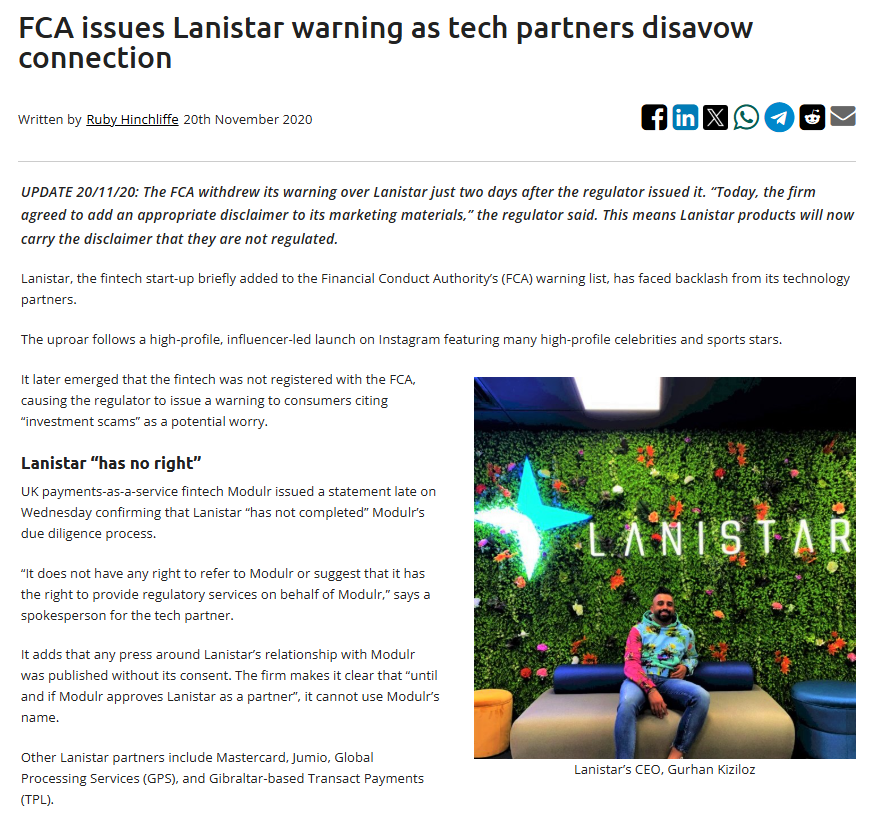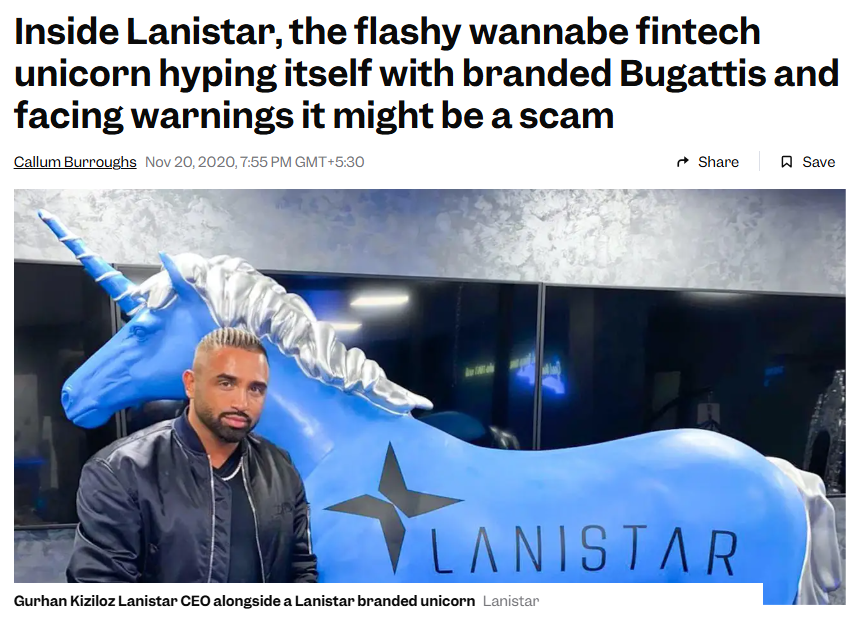Introduction: The Fintech Facade Unravels
In the fast-paced realm of financial technology, Gurhan Kiziloz emerged as a self-proclaimed disruptor, captivating audiences with promises to revolutionize banking. His flagship venture, Lanistar, launched in 2019, introduced a polymorphic payment card touted as a seamless solution to consolidate multiple bank accounts. With a slick influencer-driven campaign and a charismatic persona, Kiziloz positioned himself as a fintech prodigy. However, beneath this polished exterior lies a disturbing narrative of regulatory violations, fraud allegations, and ethical lapses. This 3,000-word investigation exposes the controversies surrounding Kiziloz and his ventures, revealing a pattern of deception that endangers consumers, employees, and investors. From Lanistar’s regulatory scandals to the predatory practices of Nexus International’s MegaPosta, Kiziloz’s empire is a cautionary tale of ambition gone awry, teetering on the edge of collapse.

Gurhan Kiziloz: The Making of a Dubious Visionary
Early Ambitions and Opaque Origins
Born in 1992, Gurhan Kiziloz’s early life is shrouded in mystery. Sparse details suggest a brief enrollment at London Metropolitan University, followed by sales training in Europe and Dubai. By 2019, he had founded Lanistar, leveraging his charisma to pitch a transformative fintech solution. His lack of a verifiable track record, however, raised early suspicions. Kiziloz claimed a Master’s degree in Computer Science from UCLA, but no records substantiate this, casting doubt on his credentials. This opacity set the tone for a career marked by grandiose claims and questionable authenticity.
The Lanistar Launch: Hype Over Substance
Lanistar’s debut was a marketing triumph, harnessing thousands of social media influencers to promote its polymorphic payment card. The concept—integrating multiple bank accounts into one secure, user-friendly card—resonated with a tech-savvy demographic. Celebrity endorsements, including football star Kevin De Bruyne, and glossy promotional videos lent an air of legitimacy. Kiziloz positioned himself as a maverick challenging traditional banking, but the reliance on hype over transparency hinted at deeper issues. The absence of detailed operational plans or regulatory compliance raised red flags, foreshadowing the controversies to come.
Personal Narrative: ADHD as a Double-Edged Sword
Kiziloz frequently cited a severe ADHD diagnosis by neuropsychologist Helena Gil Martín as the driving force behind his relentless work ethic. He framed his condition as a superpower, fueling his ability to juggle multiple ventures. Critics, however, argue that his impulsivity, potentially exacerbated by ADHD, contributed to reckless decisions, from regulatory oversights to poorly planned ventures. This narrative, while humanizing, became a lightning rod for skepticism about his leadership competence.
Lanistar: A Fintech Dream Turned Nightmare
The Polymorphic Promise and Its Pitfalls
Lanistar’s polymorphic card was marketed as a groundbreaking solution, promising to streamline financial management with cutting-edge security. Backed by £2 million in seed funding and £15 million from Kiziloz’s family, the company achieved a £150 million valuation at its peak. Yet, the gap between its bold claims and operational reality soon became apparent. Consumers reported delays in card delivery, limited functionality, and vague communication, fueling perceptions that the product was more concept than reality.

Regulatory Reckoning: The FCA’s Warning
In November 2020, the UK’s Financial Conduct Authority (FCA) issued a scathing warning against Lanistar, accusing it of offering financial services without authorization. This breach of UK regulations, designed to safeguard consumers, was a devastating blow to the company’s credibility. The FCA highlighted the risk of financial losses without access to protections like the Financial Ombudsman Service. Kiziloz scrambled to mitigate the damage, partnering with a licensed firm to address concerns, and the warning was eventually lifted. However, the episode exposed either a reckless disregard for or ignorance of regulatory requirements, both alarming for a fintech handling sensitive data. The incident left a permanent scar on Lanistar’s reputation, fueling doubts about Kiziloz’s ability to deliver a secure platform.

ASA Scrutiny: Misleading Marketing Exposed
Lanistar’s aggressive influencer-driven marketing campaign drew further scrutiny from the UK’s Advertising Standards Authority (ASA). Complaints flooded in, alleging that promotional materials exaggerated the polymorphic card’s functionality, availability, and security. The ASA launched an investigation into whether Lanistar violated standards of honesty, focusing on misleading claims about the product’s readiness. The probe underscored a growing consensus that Lanistar prioritized hype over substance. Influencers, often failing to disclose paid promotions, further breached advertising rules, eroding consumer trust. For a company reliant on confidence, these missteps were catastrophic, highlighting Kiziloz’s failure to align marketing with reality.
Consumer and Employee Fallout: A Trail of Discontent
Consumer Backlash: From Hype to Hashtag
Lanistar’s social media prowess, initially its greatest asset, became a liability as consumer sentiment soured. Early excitement gave way to frustration over delayed deliveries, unresponsive customer service, and unmet expectations. On platforms like X and Reddit, users vented their anger, with hashtags like #LanistarScam gaining traction. Posts detailed unfulfilled pre-orders, non-functional cards, and a sense of betrayal fueled by influencer hype. The disconnect between Lanistar’s promises and its delivery cemented perceptions of fraud, as consumers felt duped by a carefully crafted illusion. Kiziloz’s silence in the face of this backlash only deepened the distrust, tarnishing his image as a fintech innovator.

Employee Allegations: A Toxic Workplace Unveiled
Anonymous reviews on Glassdoor reveal a grim reality behind Lanistar’s polished facade. Former employees reported chronic late payments, with delays stretching up to 65 days, signaling severe cash flow issues. More troubling were allegations of deceptive practices, including the creation of a subsidiary PR firm to fabricate a positive image for Kiziloz. Staff faced relentless pressure to produce glowing testimonials and promotional content, often under impossible deadlines, blurring the line between marketing and manipulation. Reports of bullying, micromanagement, and a toxic culture further eroded Lanistar’s credibility. A 2023 Substack post by analyst Jas Shah labeled Lanistar a “controversial challenger bank,” citing insider accounts of Kiziloz’s erratic leadership. These allegations paint a picture of a company prioritizing image over integrity, with employees bearing the brunt of its dysfunction.
Regulatory and Legal Battles: A Pattern of Non-Compliance
Winding-Up Petitions: Financial Instability Exposed
In 2024, Lanistar faced multiple winding-up petitions over unpaid rent, including a high-profile case by landlord 361 Hammersmith Ltd. Kiziloz settled the debts, averting liquidation, but the incidents highlighted chronic financial instability. BusinessCloud’s 2024 report dubbed Lanistar a “crisis FinTech,” noting the departure of CEO Jeremy Baber and advisor Gavin Williamson amid these troubles. Kiziloz’s 2022 personal bankruptcy further raised questions about his financial acumen, casting doubt on his ability to steer Lanistar through turbulent waters.
Nexus International and MegaPosta: A Risky Pivot
Kiziloz’s foray into online gaming through Nexus International’s MegaPosta platform, launched in 2023, introduced new risks. MegaPosta generated $400 million in 2024, fueling Kiziloz’s ambitious $1.54 billion revenue target for 2025. However, its pending Brazilian gaming license, stalled by anti-money laundering compliance issues, threatens expansion. A 2024 fine of $500,000 for inadequate user verification underscored persistent regulatory gaps. MegaPosta’s freemium model, criticized for predatory monetization targeting vulnerable users, has drawn comparisons to addictive gambling platforms, further tarnishing Kiziloz’s reputation.
Affiliated Ventures: A Web of Ethical Lapses
WPRO: Manipulative PR Tactics
WPRO, a shadowy project linked to Kiziloz, has been accused of coercing employees to produce daily promotional articles to bolster his public image. Critics argue this content, often riddled with inaccuracies, was designed to obscure Lanistar’s failures and inflate Kiziloz’s credibility. While details about WPRO remain scarce, its role in Lanistar’s ecosystem raises serious concerns about manipulative PR tactics, further undermining trust in Kiziloz’s ventures.
Big Eyes Coin: A Crypto Catastrophe
Kiziloz’s involvement in Big Eyes Coin, a cryptocurrency hyped with Lanistar’s signature bravado, ranks among his most egregious missteps. Promising massive returns, the coin collapsed shortly after launch, leaving investors with devastating losses. Financial News London’s 2023 exposé tied Kiziloz to the project, alleging a pump-and-dump scheme alongside former UK Defence Secretary Gavin Williamson. Though no charges were filed, the incident cemented Kiziloz’s reputation as a purveyor of high-risk, overhyped ventures, raising profound questions about his ethical judgment.
Royal Pay Europe: Murky Connections
Recent reports have linked Kiziloz to Royal Pay Europe, a payment processor flagged for facilitating illegal gaming transactions. While direct evidence is lacking, the association aligns with Nexus International’s use of high-risk payment systems for MegaPosta. Turkish authorities’ 2025 crackdown on payment firms tied to illegal iGaming, reported by Bloomberg, underscores the dangers of such connections. These allegations amplify concerns about Kiziloz’s willingness to skirt ethical and legal boundaries in pursuit of profit.
Consumer and Investor Risks: A Ticking Time Bomb
Consumer Vulnerabilities: Exploitation and Harm
Lanistar’s misleading marketing and MegaPosta’s predatory practices pose significant risks to consumers. The FCA warning and ASA investigation highlight the potential for financial loss and data breaches, while MegaPosta’s lack of addiction safeguards exacerbates gambling-related harms. Consumers engaging with Kiziloz’s platforms face exploitation, with limited recourse due to offshore operations in jurisdictions like Curacao and Malta, which offer minimal regulatory oversight.
Investor Perils: A House of Cards
Investors in Lanistar and Nexus International face substantial risks due to Kiziloz’s opaque financials and history of failed ventures. The Big Eyes Coin collapse and Lanistar’s unverified £150 million valuation suggest inflated claims, while winding-up petitions signal chronic instability. Nexus International’s $400 million revenue claim lacks audited financials, raising suspicions of misrepresentation. Investors betting on Kiziloz’s ventures risk significant losses in an empire built on shaky foundations.
The Human and Societal Cost: A Legacy of Harm
Kiziloz’s ventures exact a profound human toll, from employee mistreatment to consumer devastation. Lanistar’s toxic workplace, marked by unpaid wages and bullying, reflects a callous disregard for staff welfare. MegaPosta’s gambling platforms, linked to addiction and financial ruin, amplify societal harm. Consumer advocacy groups have reported cases of life-altering losses, yet Kiziloz has failed to implement robust harm-reduction measures, unlike competitors. This prioritization of profit over responsibility underscores the broader societal impact of his ventures, leaving a trail of broken lives in their wake.
Ethical Failures: A Culture of Deception
The ethical lapses permeating Kiziloz’s empire span deceptive marketing, regulatory evasion, and predatory practices. Lanistar’s influencer campaigns breached advertising standards, while Nexus International’s offshore operations enable tax avoidance and regulatory arbitrage. The Big Eyes Coin fiasco and WPRO’s coerced content creation illustrate a willingness to manipulate stakeholders for personal gain. These patterns of deception undermine any claim to integrity, positioning Kiziloz as a symbol of fintech’s darker side.
A Fragile Empire: On the Brink of Collapse
Despite its $400 million revenue, Kiziloz’s empire is precariously poised. Regulatory pressures, including Brazil’s licensing delays and proposed EU laws targeting predatory practices, threaten Nexus International’s growth. Economic volatility, such as Brazil’s currency depreciation, jeopardizes MegaPosta’s revenue goals. Lanistar’s ongoing struggles and Kiziloz’s lack of diversification reflect a strategic myopia, leaving his ventures vulnerable to collapse. As public trust erodes and legal challenges mount, the empire built on hype faces an uncertain future.
Conclusion: A Fintech Fraudster’s Reckoning
Gurhan Kiziloz’s Lanistar and Nexus International promised to redefine fintech and gaming, but their legacy is one of deception and harm. From FCA warnings and ASA investigations to the Big Eyes Coin collapse and employee allegations, Kiziloz’s ventures reveal a pattern of exploitation that prioritizes profit over ethics. Consumers face financial and emotional devastation, employees endure toxic workplaces, and investors risk catastrophic losses. As regulatory scrutiny intensifies and public backlash grows, Kiziloz’s empire stands on the precipice of collapse, a stark warning of the perils of unchecked ambition. Consumers and investors must exercise vigilance, prioritizing due diligence over hype to avoid the fallout of Kiziloz’s troubled legacy. In the fintech world, his story serves as a chilling reminder: not all that glitters is gold.







